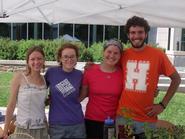
As the sun shines and Hamilton’s campus heats up during the summer months, most summer researchers retreat to the air conditioning of Kirner-Johnson and the Science Center. Three hardworking students, however, elect to spend their summers outdoors, working eight hours per day on Hamilton’s community farm garden. The three summer farm managers, Andrew Pape ’11, Sarah Gamble ’13 and Christine Roback ’12, are all dedicated workers with a taste and a passion for locally-grown produce.
The farmers have been at work now for nearly four weeks, although preparatory work for the summer has been going on since February. During the summer, the managers handle the bulk of the work in weeding, planting and harvesting. But in the spring and fall during the academic year, dozens of volunteer students contribute to the effort several times a week, notified by e-mail whenever help is needed.
The community farm had its first farm stand on June 11, staffed by the three managers and Greenhouse/Invertebrate Care Technician for the biology department Hillary Joy Pitoniak. The group set up a tent in front of the Science Center and set out, for sale, the produce that they have managed to grow and harvest so far this summer. It was a rich selection—kale, radishes, herbs, kohlrabi, chard and broccoli—and likely to increase as the summer goes on and more produce becomes available.
The community farm is almost entirely a self-contained operation. Plants are germinated in Hamilton’s greenhouses over the winter, and much of the operating costs of the farm are offset by profits from farm stand sales and from Bon Appétit Catering Service, which purchases produce from the community farm as part of its pledge to minimize its carbon footprint by providing locally-grown food.
In just its third year, the community farm is a huge hit on campus and has a regular stream of volunteers during the school months and enthusiastic and able student managers during the summer. Pape, a founding member of the farm two summers ago, says that it’s great to have seen the farm grow so much in so short a time. All three managers praise the existence of the farm, saying that “there’s nothing more sustainable than eating food you’ve grown yourself.” The farm is also, added Sarah Gamble, a great way of connecting with Hamilton that most other students never experience, and she is thankful for the opportunity to spend so much time working with the soil because it all pays off in the end.
The farmers have been at work now for nearly four weeks, although preparatory work for the summer has been going on since February. During the summer, the managers handle the bulk of the work in weeding, planting and harvesting. But in the spring and fall during the academic year, dozens of volunteer students contribute to the effort several times a week, notified by e-mail whenever help is needed.
The community farm had its first farm stand on June 11, staffed by the three managers and Greenhouse/Invertebrate Care Technician for the biology department Hillary Joy Pitoniak. The group set up a tent in front of the Science Center and set out, for sale, the produce that they have managed to grow and harvest so far this summer. It was a rich selection—kale, radishes, herbs, kohlrabi, chard and broccoli—and likely to increase as the summer goes on and more produce becomes available.
The community farm is almost entirely a self-contained operation. Plants are germinated in Hamilton’s greenhouses over the winter, and much of the operating costs of the farm are offset by profits from farm stand sales and from Bon Appétit Catering Service, which purchases produce from the community farm as part of its pledge to minimize its carbon footprint by providing locally-grown food.
In just its third year, the community farm is a huge hit on campus and has a regular stream of volunteers during the school months and enthusiastic and able student managers during the summer. Pape, a founding member of the farm two summers ago, says that it’s great to have seen the farm grow so much in so short a time. All three managers praise the existence of the farm, saying that “there’s nothing more sustainable than eating food you’ve grown yourself.” The farm is also, added Sarah Gamble, a great way of connecting with Hamilton that most other students never experience, and she is thankful for the opportunity to spend so much time working with the soil because it all pays off in the end.
